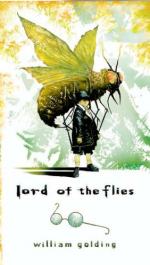|
This section contains 593 words (approx. 2 pages at 300 words per page) |

|
Critical Essay on Lord of the Flies
Summary: The quote "In literature, evil often triumphs but never conquers" does not apply to William Golding's novel "The Lord of the Flies." Golding uses the techniques of characterization, symbolism, and theme to show that evil will triumph in this case, as the symbols of good (the conch, Simon, and Piggy) perish and the symbol of evil (Jack) is rescued.
An anonymous speaker once wrote, "In literature, evil often triumphs but never conquers." That basically means that while evil is always present, good will continually prevailing. In the example of Lord of the Flies, this quote is invalid. In the novel by Williams Golding, through examinations of characterization, symbolism, and theme, it is evident that evil will triumph, and defeat any obstacles in the way to conquer.
A characterization is a representation of a character in writing by describing their actions, gestures, and looks. Authors such as Golding use that technique to give hints to readers as to what the characters may do or feel throughout the book. When Ralph is first introduced in Lord of the Flies, he is said to have fair skin, light eyes, and pale blond hair. From the very start, Ralph is depicted as somewhat of an angel, and will represent the good...
|
This section contains 593 words (approx. 2 pages at 300 words per page) |

|


